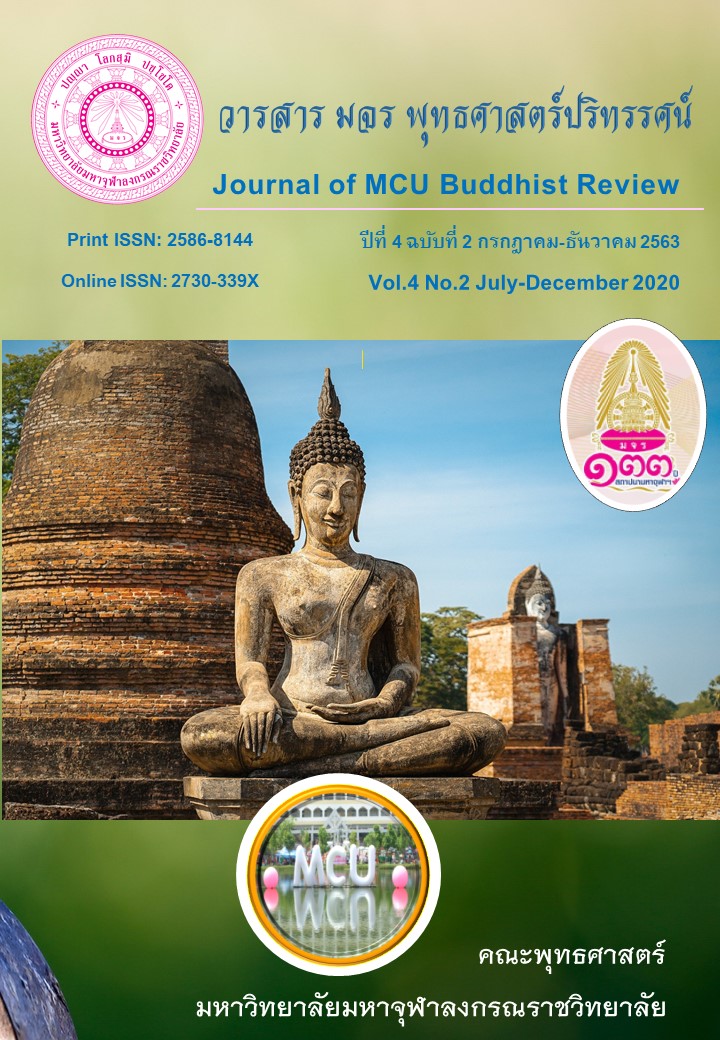วิเคราะห์หลักสารณียธรรมในคัมภีร์พระพุทธศาสนา
Main Article Content
บทคัดย่อ
หลักสารณียธรรม เป็นหลักธรรมที่ปรากฏในสารณียสูตร ซึ่งเป็นพระสูตรที่ว่าด้วยธรรมเป็นเหตุให้ระลึกนึกถึงกันและเป็นธรรมที่มีอุปการะมาก สารณียธรรม 6 ประการ ได้แก่ 1) การตั้งมั่นด้วยเมตตากายกรรมในเพื่อนมนุษย์ทั้งหลาย 2) การตั้งมั่นด้วยเมตตาวจีกรรมในเพื่อนมนุษย์ทั้งหลาย 3) การตั้งมั่นด้วยเมตตามโนกรรมในเพื่อนมนุษย์ทั้งหลาย 4) การเอื้อเฟื้อแบ่งปันในลาภผลที่เกิดขึ้นเพื่อบริโภคใช้สอยร่วมกัน 5) การมีศีลสมบูรณ์ ถึงพร้อมด้วยอาจาระและมารยาทที่ดีงาม 6) การมีความเห็นที่ประเสริฐ ที่ถูกต้องเป็นธรรมต่อเพื่อนมนุษย์และสิ่งทั้งหลาย
ในการวิเคราะห์หลักสารณียธรรมทั้ง 6 ประการนั้น จะเห็นได้ว่า พระพุทธเจ้าทรงแสดงหลักคือความเมตตาว่าเป็นจุดเริ่มต้นแห่งการประพฤติปฏิบัติต่อเพื่อนมนุษย์ด้วยกัน ความเมตตานั้นก็คือความปรารถนาที่จะให้ผู้อื่นมีความสุข มนุษย์เมื่อมีความปรารถนาดีต่อเพื่อนมนุษย์ทั้งหลายแล้ว ก็ต้องมีจิตที่ประกอบด้วยเมตตาเป็นเบื้องต้นแล้วแสดงออกโดยการกระทำทางกาย โดยการพูดทางวาจา และโดยความคิดทางใจแล้วก็เป็นอันถือได้ว่าได้งดเว้นจากอกุศลกรรมบถ 10 ประการ และเมื่อปฏิบัติต่อกันด้วยเมตตาแล้วก็จะทำให้เกิดการเอื้อเฟื้อแบ่งปันในสิ่งที่พึงบริโภคใช้สอย ตลอดถึงการรักษาอาจาระมารยาททางกายและวาจาให้เป็นปกติตามแนวทางแห่งศีล และการปรับทัศนคติให้เป็นไปโดยถูกต้อง ถูกธรรมและตามความเป็นจริงตามแบบอย่างแห่งสัมมาทิฏฐิ ก็จะเป็นสิ่งที่จะช่วยเติมเต็มให้รูปแบบของวิถีชีวิตหรือการใช้ชีวิตในสังคมเป็นไปเพื่อความสงบร่มเย็นเป็นสันติสุขยิ่ง ๆ ขึ้นไป
Article Details
- บทความที่ได้รับการตีพิมพ์เป็นลิขสิทธิ์ของวารสาร มจร พุทธศาสตร์ปริทรรศน์
- ข้อความใดๆ ที่ปรากฎในบทความที่ได้รับการตีพิมพ์ในวารสาร ถือเป็นความรับผิดชอบของผู้เขียนบทความ และข้อคิดเห็นนั้นไม่ถือว่าเป็นทัศนะและความรับผิดชอบของกองบรรณาธิการวารสาร มจร พุทธศาสตร์ปริทรรศน์
เอกสารอ้างอิง
โกวิทย์ วงศ์สุรวัฒน์. (2543). พื้นฐานรัฐศาสตร์กับการเมืองในทศวรรษที่ 21. นครปฐม: โรงพิมพ์สำนักส่งเสริมและฝึกอบรมกำแพงแสน.
จำนงค์ อดิวัฒนสิทธิ์ และคณะ. (2532). สังคมวิทยา. กรุงเทพมหานคร: โรงพิมพ์มหาจุฬาลงกรณราชวิทยาลัย.
ดวงเด่น นุเรมรัมย์. (2545). “พุทธจริยศาสตร์กับแนวคิดเรื่องสงครามที่เป็นธรรม”. วิทยานิพนธ์ศิลปะศาสตร มหาบัณฑิต. บัณฑิตวิทยาลัย: มหาวิทยาลัยมหิดล.
มหาวิทยาลัยมหาจุฬาลงกรณราชวิทยาลัย. (2539). พระไตรปิฎกภาษาไทย.ฉบับมหาจุฬาลงกรณราชวิทยาลัย. กรุงเทพมหานคร: โรงพิมพ์มหาจุฬาลงกรณราชวิทยาลัย.
มหาวิทยาลัยมหาจุฬาลงกรณราชวิทยาลัย. (2539). อรรถกถาภาษาบาลี ฉบับมหาจุฬาอฏฺฐกถา. กรุงเทพมหานคร: โรงพิมพ์มหาจุฬาลงกรณราชวิทยาลัย.
พระมหายุทธนา นรเชฏฺโฐ (ศิริวรรณ). (2556). พระพุทธศาสนากับการแก้ไขความขัดแย้งทางการเมืองในสังคมไทย. กรุงเทพมหานคร: โรงพิมพ์มหาจุฬาลงกรณราชวิทยาลัย.
พระธรรมปิฎก (ป.อ.ปยุตฺโต). (2546). พจนานุกรมพุทธศาสน์ ฉบับประมวลศัพท์. พิมพ์ครั้งที่ 10. กรุงเทพมหานคร: บริษัทเอส. อาร์. พริ้นติ้ง แมส โปรดักส์ จำกัด.
พระพรหมคุณาภรณ์ (ป.อ. ปยุตฺโต). (2551). พจนานุกรมพุทธศาสตร์ ฉบับประมวลธรรม. พิมพ์ครั้งที่ 16กรุงเทพมหานคร: บริษัท สหธรรมิก จำกัด.
พระมหาอดุลย์ คนแรง. (2541). “การศึกษาเชิงวิเคราะห์มังคลัตถทีปนี”. วิทยานิพนธ์ศิลปศาสตรมหาบัณฑิต. บัณฑิตวิทยาลัย: มหาวิทยาลัยศิลปากร.


